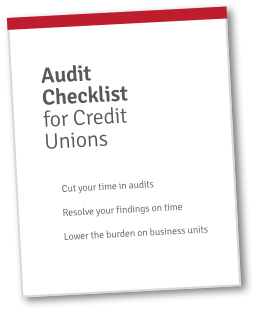To date, we still haven’t found a way to avoid audits altogether. Not that we’d want to, of course. They’re not exactly fun, but they certainly help keep things in line. Still, it would be great if they could get easier somehow…
Fortunately, that’s the exact topic of this blog. We’re going to introduce a few things you can do to streamline your credit union’s regulatory exam process.
Our main tip is something that works best for credit union exams. It may work for other audits as well, but this one in particular is best suited for NCUA exams. If that’s not what you’re after, read on anyway! Some of the other material may still be of help.
Improving the Credit Union Regulatory Exam Process
Let’s warm up to the big tip with a little tip. (Warming up will be a theme in this blog—you’ll see.)
Here’s one thing you can do to ensure that your credit union exams go well:
Be nice to your examiner.
Yeah, it sounds silly. But that’s just the way the world works. When you develop a friendly relationship with someone, they’re more likely to treat you like a human.
Some credit unions don’t foment collegial relationships with their examiners. That’s not a big deal… mostly. But it’s definitely a big deal if you’re noticeably distant. And it’s downright dangerous to cultivate a standoffish relationship. That’s a prime recipe for disaster.
If you’re nice, you’ll communicate more readily, and the whole process will feel much smoother. Plus, your examiner will be more likely to be patient, lenient, and understanding.
Think about it this way:
Let’s say you get pulled over by a cop. Would you rather be friendly or hostile?
All you need to do is be open, transparent, and communicative. Keep them updated on your progress. Give them estimates on how much time tasks will take to complete. It sounds simple, but it works.
The Real Key to Streamlining Credit Union Exams
They say that practice makes perfect. In our experience, that’s a little generous. Perfect is rare—especially in NCUA exams. Nevertheless, practice never hurts.
The NCUA even provides materials that you can use to practice with. Here are two resources for credit union exams. Study up! Because knowing the resources is only part of the battle. The next step is practice.
At Redboard, we take a slightly different approach to practice than Allen Iverson did. Practice will teach your audit team better communication and more efficient practices. It may also help you identify areas where you need more work.
But most importantly!
(Here’s where things get good. We warmed you up with the practice bit, and now we’re getting to the big reveal.)
Those two resources for credit union exams? They tell you how to practice! In some circumstances, they even tell you exactly what you’ll see on your credit union’s next regulatory exam. That means that if you practice…
Under their guidance…
You may have already completed one of the items on the document request list.
Once more for full effect:
If you practice, you may be able to pre-finish parts of your next NCUA examination.
Okay. That’s it. That’s what we came here to say. Let’s wrap it up, shall we?

FREE: Audit Checklist for Credit Unions
4 key principles and 9 questions to jumpstart your audit planning. From leading credit unions.Wrapping It Up
This is the part of the blog where we tell you to check out other blogs and content and stuff. It’s an important part of the blog, because this is where you can see what else we can help you with.
Cut 25% off the time it takes to complete an audit? Sure. Easy.
Give you an audit checklist and also teach you how to create your own? No sweat.
Or you could just subscribe to the blog. That’s always good. Or follow the links below if you like to let life take the reins.
REDBOARD’S CREDIT UNION AUDIT SOFTWARE: POINT WEST CREDIT UNION CASE STUDY
TWO UNCOMMON REGULATORY EXAM TIPS FOR AN EXTRA SMOOTH AUDIT





